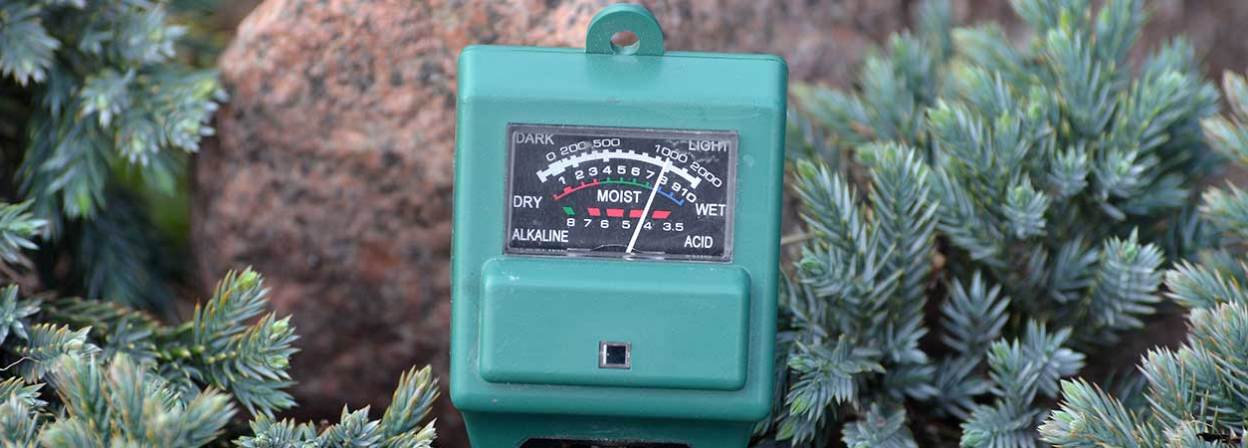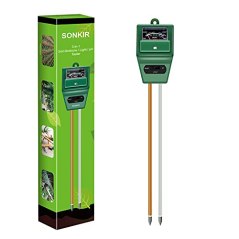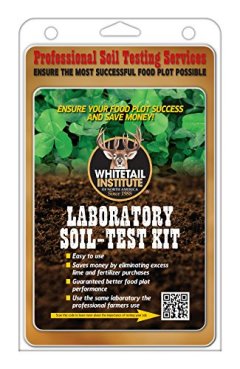Buying guide for best soil test kits
Do you want to grow big, juicy tomatoes and gorgeous roses? Before heading to the hardware store or local garden warehouse for bags of fertilizer, you need to know a bit more about your soil.
Whether you’re a new gardener who’s not sure where the best light exposure is, or you’re a seasoned pro with a green thumb who still tends to overwater, the right soil tester can help you with your gardening tasks.
In this guide, you’ll find information on what to expect from soil tests and how to put the results to best use. We want you to know more about the earth in your garden so you can reap the bounty of healthy soil.
Why test soil?
It’s essential to find out the composition and alkalinity or acidity of your soil before adding fertilizer. Without a soil test, you can’t know for sure what’s going on with the earth in your garden. A soil tester can provide you with information on potential nutrient deficiencies, enabling you to fertilize properly. The more accurate and detailed the analysis, the better equipped you’ll be to care for your soil.
A soil test can also help you avoid using too much fertilizer, which can throw your entire garden off balance, promote disease, and encourage pest populations to take up residence.
Types of soil test kits
Not all soil test kits are the same. Different products provide different readings and data for you to better understand your soil.
Instant-read probes: These soil testers feature a probe (sometimes two) that you push into the soil to get data instantly. The display typically has a dial, and the device usually doesn’t require batteries. Most models provide basic information such as light exposure, pH, and moisture content.
At-home lab test: At-home kits are a great choice for little scientists-to-be or gardeners who are looking for a more hands-on testing option. Most kits include indicator strips that can be used to test soil pH. Some at-home kits also enable you to check the nutrient composition of your soil.
Mail-in lab test: This type of test requires you to take a soil sample and mail it to a lab for analysis. There is a waiting period involved, but mail-in results are typically very accurate. Expect to receive data on soil pH and nutrient composition. The results don’t include information on light exposure and moisture content, however. Some mail-in kits can also provide you with region-specific planting suggestions and advice on how to remedy any deficiencies in your soil.
Did you know?
Some mail-in soil test kit results include suggestions on plant varieties that will thrive in your soil.
STAFF
BestReviews
Soil test kit factors to consider
Consider the following before choosing a soil test kit for your garden.
Data
Soil test kits provide you with a snapshot of your soil, but not every product delivers detailed information. For example, probes are a quick way to check light exposure, pH, and moisture level, but they can’t tell you about the soil’s nutrient content. Here’s a breakdown of each type of data and why it’s useful.
-
Light exposure: Instant-read probes can check how much light a particular spot in your garden receives to help you determine whether an area gets enough sunlight to host heat-loving plants such as tomato or eggplant.
-
Moisture content: This reading tells you how wet your soil is, enabling you to determine whether your plants are getting enough water. Checking the soil’s moisture content is a helpful way to avoid overwatering or underwatering.
-
pH: This measures your soil’s acidity on a scale of 1 to 14. Your soil’s pH should be somewhere around 7 (neutral). Why does pH matter? If the pH isn’t right, the plants may not absorb the nutrients they need – even if you’re adding fertilizer.
-
Temperature: Some soil testers also provide information on temperature. Certain seeds require specific temperatures to germinate, so knowing how warm the earth is can help guide your planting schedule.
- Nutrients: At-home and mail-in test kits provide additional information on your soil’s composition. The most important nutrients are nitrogen, phosphorus, and potassium (abbreviated as NPK). Most commercial fertilizers are designed to replenish these three elements. Adding fertilizer without knowing what’s really missing can adversely impact soil health.
Accuracy
Unless you’re a farmer, it’s unlikely that you’ll need to know the exact pH level of your soil. Most soil test kits are accurate enough to give you a rough idea of whether your soil is basic, neutral, or acidic. Look for probes with a broad range for better accuracy when measuring pH.
Getting accurate NPK data is crucial, and soil test kits provide an easy, convenient way to figure out how much of each nutrient is in your soil. Look for kits that enable you to take a large soil sample for better results. Overall, mail-in kits are the most accurate.
"If you’re collecting soil samples to send off to a lab, don’t include wet soil. You could end up with inaccurate results."
STAFF
BestReviews
Indoor or outdoor use
Soil testing probes are typically designed for both indoor and outdoor use, but some models with wireless capabilities are designed specifically for use with indoor plants. Check the manufacturer’s guidelines to make sure you’re using the device correctly. We don’t recommend leaving probes outside unless they’re specifically designed to be left out in the weather.
Wireless capability
Some instant-read soil tests are WiFi enabled, allowing you to check on soil health via a smartphone app. Alerts can be sent to let you know when your plants lack water or sunlight. Some WiFi soil testers are capable of alerting you to nutrient deficiencies, too.
Multiple tests
Many at-home testing kits allow you to perform more than one test. Why choose a kit with multiple tests? You might need to retest your soil after amending it, or you could make a mistake and need to perform a second analysis.
Soil test kit prices
In general, lab tests, kits with multiple tests, and kits that provide NPK information are more expensive.
For test kits with instant-read probes, the more sophisticated the instrument, the higher the price.
Regardless of the option you choose, you can expect to pay between $10 and $20 for a soil test kit. Most mail-in kits don’t charge extra for shipping.
FAQ
Q. What do I do if my soil’s pH isn’t ideal? How can I fix it?
A. Most garden soil has a neutral pH between 6.5 and 7. If you find your soil’s pH isn’t within that range, you might need to take some corrective measures. Before doing so, however, consider adding organic matter to your garden. It helps plants tolerate less than ideal pH levels. Using amendments like compost or worm castings also helps improve the microorganism content in the soil, which can slowly lower pH over time. Most mail-in soil testing kits offer suggestions for corrective measures. However, a slight deviance from the normal pH range isn’t usually anything to worry about.
Q. Will adding coffee grounds to my garden affect the pH of my soil?
A. There’s a common belief that adding coffee grounds to the garden will increase the acidity of the soil. Since coffee grounds have a nearly neutral pH (6.8), it’s unlikely that adding them will affect your soil’s pH. Some folks even use grounds as mulch. It’s true that some plants don’t like the acidic mulch, but unless you’re using truckloads of the stuff, you’re unlikely to have a problem. We recommend adding coffee grounds to your compost pile instead of directly around plants just to be safe.
Q. What is NPK?
A. NPK stands for nitrogen, phosphorus, and potassium, the primary nutrients required by plants to survive.
Q. Are at-home testing kits accurate enough to be worth my time?
A. A professional lab test will provide you with the most accurate results. If you think you have a nutrient imbalance in your soil, we recommend mail-in kits to get the most detailed information regarding your soil’s health. When it comes to getting info on moisture, pH, and light, a soil tester probe is a convenient, inexpensive tool that can help you quickly pinpoint whether you’re overwatering plants, planting in an area that’s too shaded, or have a severe pH issue.



















